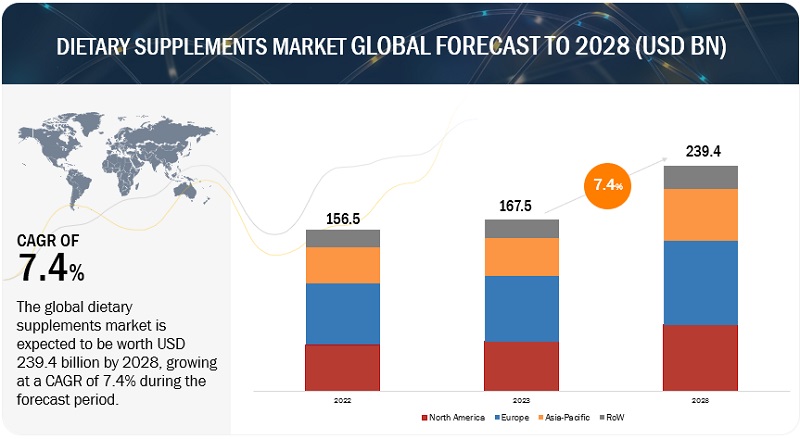The global dietary supplements market is projected to grow from USD 167.5 billion in 2023 to USD 239.4 billion in 2028, at a CAGR of 7.4% during the forecast period. The factors driving the growth are the increasing elderly population, the shift from pharmaceuticals towards nutraceuticals, amino acids, and protein supplements due to the focus on preventive healthcare, and the growing personalized nutrition, which is supporting the dietary supplement industry. Consumers are shifting focus toward self-directed care driven by the growing personal health, weight management, and well-being trends. The personal care markets have changed drastically in recent years, with consumers adopting weight management and protein supplements to help manage lifestyle disorders. In most of the region, it is seen that people do not take an adequate amount of protein, and because of this, the need for amino acids and protein supplements is increasing. Additionally, due to wrong eating habits and improper lifestyles, a vast majority of consumers are opting for weight management supplements to curb obesity and overweight issues.

Dietary supplements are products intended to supplement the diet and provide additional nutrients that may be missing or insufficient in a person’s daily intake. These supplements can come in various forms, including pills, capsules, powders, liquids, and even chewable gummies. They are designed to complement a balanced diet and support overall health and well-being.
Key points about dietary supplements:
Nutrient Boost: Dietary supplements often contain vitamins, minerals, amino acids, enzymes, herbs, or other botanicals to fill nutritional gaps in one’s diet. These substances play essential roles in various bodily functions, promoting optimal health.
Regulatory Oversight: In many countries, regulatory agencies such as the U.S. Food and Drug Administration (FDA) oversee dietary supplements, but they are not regulated as strictly as pharmaceutical drugs. This means that manufacturers are responsible for ensuring the safety and labeling accuracy of their products.
Common Supplements:
1. Vitamins and Minerals: These are micronutrients crucial for various bodily functions. Common examples include vitamin C, vitamin D, calcium, and iron.
2. Herbal Supplements: Derived from plants, these supplements may be used for various purposes, such as immune support, stress relief, or promoting better sleep. Examples include echinacea, ginseng, and chamomile.
Health Benefits: Dietary supplements are often marketed to address specific health concerns, such as improving immune function, supporting bone health, or enhancing cognitive performance. However, their effectiveness can vary, and individual responses may differ.
Caution and Consultation: While supplements can be beneficial, it’s crucial to exercise caution. Excessive intake of certain vitamins and minerals can have adverse effects, and interactions with medications may occur. Before starting any new supplement regimen, individuals should consult with healthcare professionals, especially if they have underlying health conditions or are taking medications.
Whole Foods vs. Supplements: While supplements can help meet nutritional needs, obtaining nutrients from whole foods is generally considered preferable. Whole foods provide a combination of nutrients and other beneficial compounds that may not be present in isolated supplements.
Dietary Supplements Market Trends
1. Increasing Demand for Natural and Organic Products: Consumers are becoming more health-conscious and are seeking natural and organic alternatives to conventional supplements. This trend is driven by concerns over synthetic ingredients, GMOs, and environmental sustainability.
2. Personalization and Customization: There’s a growing interest in personalized nutrition, with consumers seeking supplements tailored to their specific needs and health goals. This trend is fueled by advancements in technology, such as DNA testing and wearable devices, which allow for more accurate and personalized recommendations.
3. E-Commerce and Direct-to-Consumer (DTC) Channels: The rise of e-commerce platforms has transformed the dietary supplements industry, making it easier for consumers to access a wide range of products online. DTC brands are also gaining popularity, as they offer convenience, transparency, and often lower prices compared to traditional retail channels.
4. Focus on Immune Health: The COVID-19 pandemic has heightened awareness of the importance of immune health, leading to increased demand for supplements containing ingredients like vitamin C, vitamin D, zinc, and probiotics. Manufacturers are responding by introducing immune-boosting formulations and marketing them as essential for overall well-being.
5. Transparency and Quality Assurance: Consumers are becoming more discerning about the quality and safety of dietary supplements, prompting manufacturers to invest in third-party testing, certifications, and transparent labeling practices. Brands that can demonstrate purity, potency, and adherence to regulatory standards are gaining trust and loyalty from consumers.
6. Plant-Based and Vegan Supplements: As plant-based diets gain traction for their perceived health and environmental benefits, there’s a growing demand for plant-based and vegan supplements. This includes products made from ingredients like algae, mushrooms, and botanical extracts, which are marketed as sustainable alternatives to animal-derived ingredients.
7. Focus on Mental Health and Stress Management: With rising stress levels and awareness of mental health issues, there’s a growing market for supplements targeting mood support, stress relief, and cognitive function. Ingredients like adaptogens, herbs, and omega-3 fatty acids are being promoted for their potential to enhance resilience and promote emotional well-being.
8. Regulatory Changes and Scrutiny: Regulatory bodies are increasingly scrutinizing the dietary supplements industry to ensure compliance with safety standards and prevent misleading claims. Manufacturers are facing stricter regulations regarding product labeling, advertising, and ingredient sourcing, which may impact market dynamics and consumer trust.
North America holds the highest market share during the forecast period.
North American nutrition and supplements hold the largest market share and are expected to expand further. North American population has become more aware of health and adopting dietary supplements as a part of their daily diet regime, to have overall benefits on health and weight. The population in the region is more prone to lifestyle disorders like diabetes, obesity, and blood pressure, due to improper diet. The region is more inclined towards consuming junk and processed food that are devoid of nutrition, which gives rise to health disorders. Additionally, the trend of consuming vegan and less processed food is leading to the increased intake of dietary supplements to tackle nutritional deficiencies. Additionally, South Africa seems to be a potential market, in terms of production and consumption of dietary supplements. The general trend of malnourishment and other nutritional deficiencies is seen in the population in the South African region. Together, it drives the overall dietary supplements market.
Dietary Supplements Market Share
Key players in this market include Nestle (Switzerland), Abbott (US), Amway Corp (US), Pfizer Inc. (US), ADM (US), International Flavors & Fragrance (US), Otsuka Holdings Co., Ltd (Tokyo), Glanbia PLC (Ireland), GSK PLC. (UK), Bayer AG (Germany), Herbalife International of America, Inc. (US), Nature’s Sunshine Products, Inc (US), Bionova (Canada), ArkoPharma (France), American Health (US), Pure Encapsulation (US), H&H Group (Hong Kong), Nu Skin (US), Power Gummies (India), Biomedical Research Laboratories (US), HealthKart (India), NutriScience Corporation (US), Nature’s Essentials (US), and Life Extension (US).
Dietary Supplements Market Industry News:
1. In February 2023, Otsuka Pharmaceutical Co., Ltd. (Japan) partnered with Tokyo Marathon in order to provide health management support for approximately 38,000 participating runners and 80 race officials. This will increase public awareness focusing on the importance of exercise and nutrition which is part of the strategic development of the company.
2. In December 2022, Amway opened a Business Innovation Hub in Singapore in partnership with the Economic Development Board to meet evolving wellness needs in Asia. This strategic expansion helps Amway tap into the growing demand for tailored health and wellness solutions in the region, which is expected to boost the company’s sales and profitability.
3. In May 2022, Nestlé expands its presence in the Brazilian dietary supplement market through the acquisition of Puravida. This strategic move enhances Nestlé’s supplement offering, strengthening its position and capturing growth opportunities in Brazil’s thriving health and wellness industry.
Get 10% Free Customization on this Report: https://www.marketsandmarkets.com/requestCustomizationNew.asp?id=973
About MarketsandMarkets™
MarketsandMarketsTM has been recognized as one of America’s best management consulting firms by Forbes, as per their recent report.
MarketsandMarkets™ is a blue ocean alternative in growth consulting and program management, leveraging a man-machine offering to drive supernormal growth for progressive organizations in the B2B space. We have the widest lens on emerging technologies, making us proficient in co-creating supernormal growth for clients.
Earlier this year, we made a formal transformation into one of America’s best management consulting firms as per a survey conducted by Forbes.
The B2B economy is witnessing the emergence of $25 trillion of new revenue streams that are substituting existing revenue streams in this decade alone. We work with clients on growth programs, helping them monetize this $25 trillion opportunity through our service lines – TAM Expansion, Go-to-Market (GTM) Strategy to Execution, Market Share Gain, Account Enablement, and Thought Leadership Marketing.
Built on the ‘GIVE Growth’ principle, we work with several Forbes Global 2000 B2B companies – helping them stay relevant in a disruptive ecosystem. Our insights and strategies are molded by our industry experts, cutting-edge AI-powered Market Intelligence Cloud, and years of research. The KnowledgeStore™ (our Market Intelligence Cloud) integrates our research, facilitates an analysis of interconnections through a set of applications, helping clients look at the entire ecosystem and understand the revenue shifts happening in their industry.
Media Contact
Company Name: MarketsandMarkets™ Research Private Ltd.
Contact Person: Mr. Aashish Mehra
Email: Send Email
Phone: 18886006441
Address:630 Dundee Road Suite 430
City: Northbrook
State: IL 60062
Country: United States
Website: https://www.marketsandmarkets.com/Market-Reports/dietary-supplements-market-973.html

